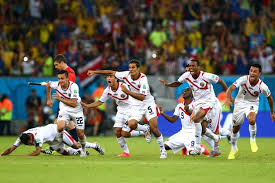By Andrew Warshaw
August 5 – The World Cup may be a month old but surprise quarterfinalists Costa Rica, with just 4.3 million inhabitants, are far from resting on their laurels after disproving more than a few myths about being one of the underdogs in Brazil.
The world at large may have been surprised by the country’s remarkable achievement in reaching the last eight but those who have been closely involved with the progression don’t share that view. “For me personally, it was no big surprise,” says Henry Duarte, technical director of the Costa Rican federation.
“In my mind, I was expecting a result like that. We have an immense pool of talent at our disposal …We were in the top 30 of the FIFA rankings before the World Cup even started. Now we are in 16th place. Many people overseas were probably not aware of our progress before now. Whenever Costa Rica is mentioned, the conversation usually relates to tourism. The federation has been carrying out targeted development work and has provided a solid foundation for the national team.”
Costa Rica topped their group ahead of three former World Cup winners and in an interview with FIFA’s weekly magazine, Duarte explained that coach Jorge Luis Pinto had meticulously studied Uruguay, England and Italy.
“Our exceptional preparations were key to our success. We caught Uruguay on the wrong foot with our strong defence, excellent organisation and the ability to switch quickly from defence to attack. By the time we played Italy and England it was already too late for them, as it is almost impossible to change your approach during a tournament. Our performances in Brazil were a tactical masterstroke and could serve as a lesson for any coaching seminar.”
Duarte explained how the central American country, which last qualified for the finals in 1990, have benefitted from the knock-on effect of winning so many friends in Brazil. The next goal is to create an under-23 team in time for the 2016 Rio Olympics and then to qualify for the 2018 World Cup in Russia.
“Up to now we’ve been quite isolated and have only occasionally been able to test ourselves against major countries. Our clubs are already benefitting from football’s improve profile in this country and eight of the 12 teams in our top flight have been invited to training camps in the USA, Canada or Mexico. That would have been inconceivable before the World Cup in Brazil.”
Contact the writer of this story at moc.l1744827240labto1744827240ofdlr1744827240owedi1744827240sni@w1744827240ahsra1744827240w.wer1744827240dna1744827240

